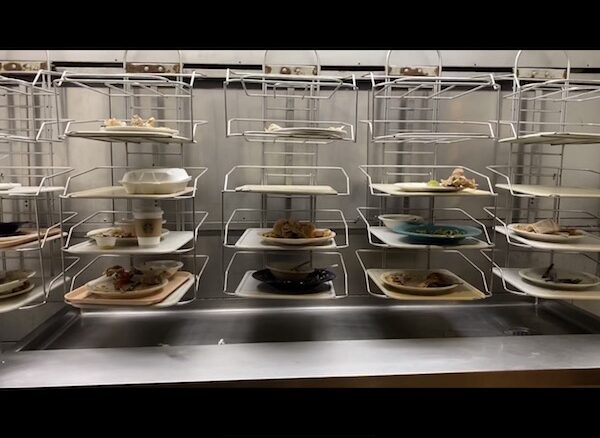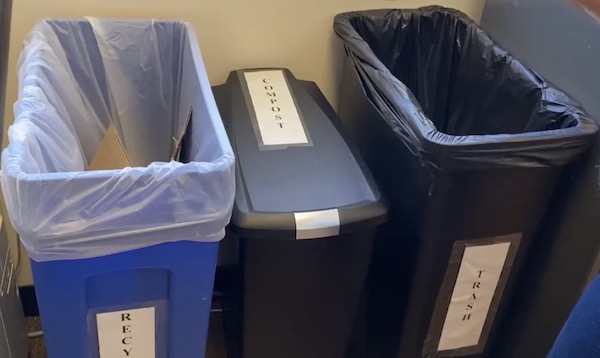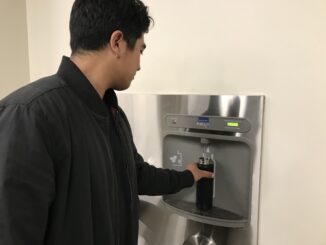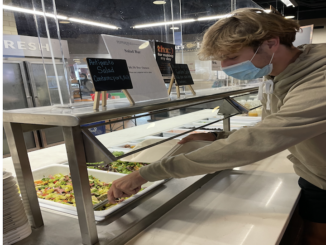
The conversation about conservation is growing as composting comes to Pepperdine’s campus.
The Waves Cafe composts all food scraps. The community garden on campus includes a composting bin. And now there’s a composting bin in the joint Social Science and Religion and Philosophy divisions office suite on campus. Pepperdine students and faculty alike believe composting is a service to the environment.
“Food waste is considered to be one of the major causes of greenhouse gas emissions,” said Scottie Sandlin, GreenTeam president and a junior rhetoric and leadership major with a sustainability minor. “Composting allows me to think more critically about the food waste I am leaving behind when I am eating.”
A Pepp Post poll of 51 students found that most of the students see the benefits of composting.
Sandlin understands why some students may find composting to be unattractive, but she believes it is essential to the environment and every Christian’s mission.
Pepperdine’s current composting locations
The poll found that approximately 90% of students are not aware of any places on campus to compost.
Although composting is not as widespread on campus as recycling is, there are a couple of places where composting is done.
Edward Wroten, marketing director of Sodexo at Pepperdine, said Sodexo collects all food scraps.
“We put all food scraps pre consumer and some post consumer in green trash cans,” Wroten said. “Once they are full, we take them down to the loading dock and get an empty one. Waste Management picks them up a few times a week and does the actual composting.”
Waste Management is the main service provider in Malibu and most of Southern California. The company does not offer composting options for residents, said Lisa Hemenway, community relations specialist of Waste Management in Los Angeles County. Hemenway declined to comment further, and referred questions to LA Compost, a nonprofit that promotes composting.
Sandlin said there is a composting bin at the community garden, where students can potentially bring small amounts of food scraps to compost. The Center of Sustainability and the GreenTeam manage the community garden. It is located across the street from mail services below the intramural soccer field.
Christopher Doran, religion professor and founder and coordinator of the sustainability minor, said students and staff currently do not bring food scraps to the compost bin as it is not large enough to handle such a load.

Madison Weeks, administrative assistant of the Religion and Philosophy Division, and Jeff Webb, administrative assistant of the Social Science Division, started a composting bin in their shared joint division office space. Student workers take the compost down to the Sodexo bins behind the Tyler Campus Center a few times a week. They both said composting would help increase sustainability measures in their office.
“As an office we try to make steps toward a more sustainable office,” Weeks said. “We’ve had other projects that we have done, and the composting initiative is another step in the right direction we wanted to take.”
Webb said they have a lot of faculty who share the office space, and figured it would be a good place to start in having composting on campus.
Webb also said he hopes that the office is providing an example for other academic divisions and non-academic divisions in their composting efforts.
Pros and cons of composting
A Pepp Post poll of 51 students found that student knowledge on composting varied.
Doran said there are many benefits to composting.
“Forty percent of all food that is purchased is turned into food waste,” Doran said. “If food waste itself was an emitter of climate change gases, it would be the third largest emitter because when food breaks down in landfills without oxygen, it changes into methane gas which is a dangerous gas that traps more light, and causes climate change to accelerate even quicker.”
California generated 76.5 million tons of solid waste in 2016, with 56 percent disposed of in landfills and 44 percent recycled or composted, according to CalRecycle.
Food scraps are unable to biodegrade in landfills, according to Nature Bag, a bioplastics company that seeks to create environmentally sustainable alternatives to conventional plastics. They rot anaerobically, and the degrading material from the food scraps in the landfill creates methane.
Doran also said farmers could receive more nutrients for their soil if more people composted.
“By composting, you are taking those food scraps and are turning it back into a type of organic material that can go back into the soil,” Doran said. “You are encouraging the soil to be regenerating, rather than to die off and erode away.”
Hope Lockwood, a philosophy and political science double major and member of the GreenTeam, said food scraps account for much of society’s waste, and composting could help mitigate that. She also said people should seek to do more composting and to be more mindful of sustainable options.
“We aren’t treating the Earth the way we need to,” Lockwood said. “Farmers are seeing a lack of nutrients in our food because we aren’t composting. We also have people that aren’t careful with what they eat or what they use because they don’t want to put in the effort to see what the correct sustainable choice is.”
Kenny Derieg, westside regional hub manager of LA Compost, which sets up community gatherings for composting, said composting is inexpensive.
“Costs are often only associated with gathering materials to make compost,” Derieg said.
Doran said there are minor cons to composting, only if people do not set up their composting bins appropriately.
“Some people complain about the smell, but most compost smell issues are due to not managing the compost pile appropriately,” Doran said. “Another con that people seem to think is that it attracts rodents and other pests into your house. These are only problems if you don’t have a good balance between green waste (fruit scraps, carrot tops) and brown waste (tree leaves, sawdust).”
Doran said the pros of composting far outweigh the cons.
Christianity and composting
Many experts and students alike said composting and other sustainability measures are part of a Christian’s duty.
Sandlin said Christians are looking to serve everyone and the planet better. If people composted or ate all of the food they had instead of wasting it, they would achieve this.
“As Christians, we have the obligation to serve brothers and sisters as Christ intended,” Sandlin said. “One of the ways we can do that is to put intentionality behind the actions that we do such as food waste. This means we eat the food that we buy instead of wasting it.”
Doran said composting and other sustainability measures would enable Christians to be environmentally friendly.
“Christians like to say they are good stewards of the environment,” Doran said. “Composting is an example of caring for the planet because you are reconnecting yourself to actual cycles and trying to care for things from the soil upward. To engage in that, and to connect yourself to that loop is a way of understanding your faith better, understanding people better, and understanding how the planet works.”
He also said that sustainability helps Christians be mindful of the Earth around them and the choices they make to improve the environment.
Lockwood agreed with Doran’s statement, and believes people in general should help improve the environment after many years of polluting it.
“We, as humans, are told to be stewards of the Earth,” Lockwood said. “Being stewards of the Earth involves us taking care of the animals and people that are in it. Unfortunately, we have spent a long time trashing the Earth through polluting it with chemicals.”
Students who compost at home
Although many students said they are unaware of any composting options at Pepperdine, some of these students compost at home.
The poll found that approximately 28% of students said they currently compost at home.
Abigail Munzar, a freshman art history major, said her family composts when she is home in Livermore, California.
“We have an organic spin outside of our house, so that’s why we compost,” Munzar said. “I wish Pepperdine would add composting, and make it a viable option for students.”
Senior English major Anemone Hansen also said she composts at home, but is unsure how to compost on her own. She thinks composting would be a great addition to Pepperdine.
“It’s easier not to compost, but I would rather compost than not,” Hansen said. “It’s kind of like recycling. If you throw away something that could possibly be reused, that’s a waste.”
Future possibilities of composting at Pepperdine
The poll found that approximately 56% of students would participate in composting on campus if it were available. It also found that most students polled said they would be open to composting in their on-campus dorm or apartment.
Munzar said she would love to see more composting bins on campus.
“I think I would benefit from composting on campus,” Munzar said. “It is nice to give back to nature, and it would be nice for the Pepperdine community to be united in giving back to the environment through this. I think it’s good to be more sustainable and to just be more aware.”
Some do believe that sustainability should be a main priority, no matter the financial burden.
Sandlin said she believed students could take steps toward sustainability if they compost.
“If students are willing to try to set up composting bins in their dorms and then take it to the garden, it could work,” Sandlin said.
Lockwood said she is skeptical of students composting on campus due to many students’ lack of knowledge on recycling.
“Seeing how my suitemates treat our recycling container, I don’t think students are ready for composting,” Lockwood said.
Weeks said that although there is a learning curve with composting, she is hopeful it will be more extensive across campus one day. She also said there is a possibility of a more extensive on-campus composting facility in the future.
“We have talked to the Center of Sustainability, and we are looking to have an on-site composting facility,” Weeks said. “This could be a possibility in the near future, and I think composting could be a success on campus if students, faculty and staff take a mental shift.”
Webb said composting on campus could be a success if Pepperdine helps prepare its students.
“A big part of the success of composting on campus would be providing education for those who are not aware of composting procedures,” Webb said. “I think a part of creating a positive change is providing that education for people to know what they are doing and why it is beneficial. I think this is an important step for composting to be successful on campus.”
Race Dalton completed the reporting for this story in Jour 241 in Fall 2021 under the supervision of Dr. Christina Littlefield and Dr. Theresa de los Santos. Dr. Littlefield supervised the web version of the story.




